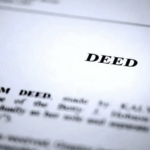Deed Drafting

A lawyer can be invaluable when it comes to deed drafting, ensuring that all legal requirements are met, your interests are protected, and the deed serves its intended purpose. Deeds are legal documents that transfer ownership of property, grant rights, or create interests in real estate, and drafting them requires a thorough understanding of property law. Here’s how a lawyer can help you with deed drafting:
1. Ensuring Proper Legal Language and Structure
- Clear and Precise Language: A lawyer will draft the deed using precise legal terminology to avoid ambiguity or confusion. The language needs to clearly express the intent of the parties and comply with legal standards, ensuring the deed is enforceable.
- Correct Legal Structure: Deeds must meet specific formalities to be legally valid. A lawyer will ensure the deed is structured correctly and includes all the necessary elements, such as the names of the parties, a description of the property, and the consideration (the value exchanged).
2. Determining the Correct Type of Deed
There are different types of deeds for various purposes. A lawyer will help you determine which type of deed is most appropriate for your situation. Common types include:
- Warranty Deed: Guarantees that the seller has clear title to the property and will defend against any future claims to the property.
- Quitclaim Deed: Transfers whatever interest the grantor has in the property without any warranties, often used in situations like transferring property between family members.
- Special Purpose Deeds: Such as trust deeds, deeds in lieu of foreclosure, or deeds of gift that may be required depending on your specific circumstances.
3. Proper Identification of the Property
- Accurate Legal Description: A critical aspect of any deed is the correct legal description of the property being transferred. A lawyer ensures the property description is accurate and properly referenced in the deed, often by referencing survey maps or property records.
- Avoiding Ambiguity: If the property’s description is unclear or disputed, a lawyer can help clarify it, reducing the risk of future legal challenges.
4. Compliance with State and Local Laws
- State-Specific Requirements: Property laws vary by state, and each jurisdiction may have its own specific requirements for deed drafting. A lawyer will ensure that your deed complies with the laws in your state, including formalities like witnessing, notarization, and specific wording.
- Transfer Taxes and Fees: A lawyer can help identify any applicable transfer taxes or fees related to the deed and ensure they are properly calculated and paid, if required.
5. Title Considerations
- Title Search: Before drafting a deed, a lawyer may recommend conducting a title search to confirm the current ownership of the property and identify any encumbrances (such as liens or mortgages) that may need to be addressed.
- Clear Title: If there are issues with the property’s title (e.g., outstanding debts or disputes), the lawyer can advise on how to resolve these before transferring ownership or creating a new interest in the property.
6. Incorporating Special Terms or Conditions
- Conditions and Covenants: Sometimes, a deed may need to include specific conditions or restrictions (e.g., a life estate, easement rights, or a restriction on the use of the property). A lawyer can draft these provisions to ensure they are legally enforceable.
- Trusts or Estates: If the deed involves property held in a trust or as part of a decedent’s estate, the lawyer can ensure the deed complies with trust terms or the decedent’s wishes, and properly reflects the transfer to the beneficiary.
7. Ensuring Proper Execution and Recording
- Execution Formalities: A lawyer will ensure that the deed is executed in accordance with the necessary formalities, which typically include signatures from the grantor(s), notarization, and, in some cases, witnesses.
- Filing and Recording: After the deed is executed, a lawyer can assist in properly filing and recording it with the local county recorder’s office or other relevant authorities. This step is crucial for ensuring that the transfer of property is legally recognized and that the deed is part of the public record.
8. Tax Implications and Estate Planning
- Tax Advice: In some cases, transferring property through a deed (such as gifting property or selling property to a family member) may have tax implications. A lawyer can help you understand potential gift taxes, capital gains taxes, or estate tax considerations that may apply.
- Estate Planning: If the deed is part of an estate planning strategy (for example, transferring property to heirs through a living trust or as part of a will), a lawyer can draft the deed in conjunction with your broader estate plan to ensure it aligns with your goals.
9. Dealing with Complex Scenarios
- Co-ownership: If multiple people are involved in the property transfer (such as transferring property to co-owners), a lawyer can help clarify the ownership structure (e.g., joint tenancy, tenancy in common) and ensure the deed reflects the arrangement.
- Business Transfers: In some cases, the deed may involve a business property, and a lawyer can draft the deed to reflect the interests of the business, its shareholders, or partners.
- Bankruptcy or Foreclosure: If the property transfer is related to a bankruptcy, foreclosure, or other financial distress situation, a lawyer can help navigate the complexities of transferring property under these circumstances, ensuring legal compliance and protecting your interests.
10. Mitigating Future Disputes
- Preventing Future Legal Issues: A lawyer will ensure that all necessary provisions are included in the deed to avoid potential future disputes, such as unclear ownership interests, conflicting rights, or issues with third parties.
- Dispute Resolution: If any issues arise after the deed is executed, a lawyer can help resolve disputes, whether through negotiation, mediation, or litigation.
Conclusion
Deed drafting is a highly technical and important legal process that requires attention to detail and an understanding of property law. A lawyer will ensure that the deed is correctly drafted, complies with state laws, accurately reflects the parties’ intentions, and avoids potential future disputes. Whether you’re transferring property, creating a life estate, establishing a trust, or addressing tax concerns, a lawyer’s expertise can protect your interests and help you navigate the complexities of property transactions.
If you need a deed drafted, it's always a good idea to consult with a lawyer to ensure that all aspects of the transaction are handled properly and in accordance with the law. Would you like to explore a specific type of deed? Contact us today for a free case evaluation.
